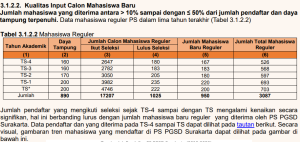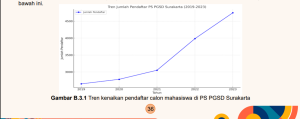Admission
Recruitment and Selection of New Students
The Primary School Teacher Education (PGSD) Study Program at the Faculty of Teacher Training and Education (FKIP), Universitas Sebelas Maret (UNS) Surakarta, conducts a systematic, integrated, and continuous recruitment process in line with national education policies issued by the Ministry of Education, Culture, Research, and Technology. Student admissions are managed through three primary pathways: Seleksi Nasional Berdasarkan Prestasi (SNBP) or National Selection Based on Academic Achievement, Seleksi Nasional Berdasarkan Tes (SNBT) or National Selection Based on Tests, and the UNS Independent Selection (SM-UNS). The entire process is professionally managed by the UNS New Student Admission Unit (UPT SPMB) under the principles of transparency, accountability, objectivity, and inclusivity.
A distinctive feature of the selection process for the PGSD program is the inclusion of a pedagogical aptitude test and an essay on teaching motivation. In accordance with Dekan’s Decree No. 1808.1/UN27.02/HK 04/2021, all applicants are required to submit an essay outlining their motivation to become a teacher and their reason for choosing FKIP UNS. This non-cognitive assessment component serves to identify candidates with a genuine calling for the teaching profession.
The SM-UNS admission path includes several schemes:
SMJU-UTUL: Written examination administered by UNS,
SMJU-UTBK: Based on UTBK scores issued by the National Testing Agency (BP3),
SMJKI-UTUL and SMJKI-UTBK: For international class applicants,
SMJKM: Partnership scheme,
SMJP: Achievement-based selection,
SMJD: Affirmative action for students with disabilities,
SMJK: Religious and community-based affirmative track.
Each track has distinct criteria and procedures tailored to diverse applicant profiles. SNBP evaluates academic performance from semesters 1–5 (for three-year senior high schools) or semesters 1–7 (for four-year vocational schools), while SNBT requires candidates to take the UTBK, which assesses literacy, reasoning, and numeracy skills.
Admission quotas generally follow national standards: 30% for SNBP, 40% for SNBT, and 30% for the independent track (SM-UNS), although adjustments may occur depending on institutional policies. Final admission decisions are based on a weighted combination of academic records, portfolios, UTBK scores (if applicable), motivational essays, and results from additional evaluations such as interviews for specific pathways.
This recruitment system not only attracts candidates from various regions and academic backgrounds but also promotes inclusion. For instance, the SMJD pathway enables students with disabilities to pursue a professional career in teaching. Overall, PGSD UNS’s admission process is designed to ensure meaningful initial engagement with future teachers who demonstrate integrity, social responsibility, and strong dedication to primary education in Indonesia.
Quality of Incoming Students in PGSD Surakarta
Over the past five academic years (TS-4 to TS), the input quality of new PGSD students has shown a consistent upward trend, both in terms of applicant volume and selection competitiveness. As presented in Table 3.1.2.2, the number of applicants significantly increased from 2,647 in TS-4 (2019) to 4,746 in TS (2023). Meanwhile, the program’s intake capacity remained stable, ranging from 160 to 200 students per year, underscoring a deliberate strategy of maintaining selective admission standards.
Between TS-4 and TS, a total of 17,207 applicants registered for the selection process, but only 1,025 students were admitted, resulting in an average admission rate of less than 6%—highlighting the highly competitive nature of the selection process. Of these, 950 students were officially enrolled as new regular students, filling the program’s capacity to nearly full each year. This resulted in an applicant-to-admission ratio exceeding 10% but below 50%, which aligns with accreditation standards regarding program attractiveness and competitiveness.
The cumulative number of regular students over five years reached 3,087, with stable annual distribution. This indicates that the PGSD program at FKIP UNS remains a top choice among prospective primary education students nationwide. The increasing demand reflects both the reputation of PGSD UNS and the growing public trust in its academic quality and graduate outcomes. The program’s consistent use of merit-based and inclusive selection criteria—emphasizing motivation for teaching and pedagogical aptitude—continues to ensure that it recruits high-quality candidates committed to contributing meaningfully to the education sector


